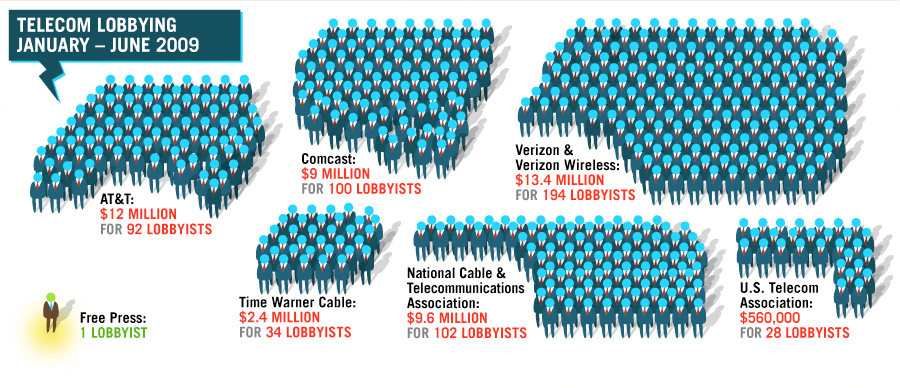Senator Kay Bailey Hutchison (R-Texas), who often adopts anti-consumer positions on telecommunications policy, has written a so-called “killer amendment” that would prohibit the Federal Communications Commission from enforcing proposed Net Neutrality rules.
Her amendment, informally proposed Monday as part of a House Interior Appropriations spending measure (H.R. 2996) states:
Purpose: To prohibit the FCC from expending any funds in fiscal year 2010 to implement any Internet neutrality or network management principles, or to promulgate any rules relating to such principles.
Hutchison’s amendment has several Republican co-sponsors: John Ensign (R-Nevada), Sam Brownback (R-Kansas), David Vitter (R-Louisiana), Jim DeMint (R-South Carolina), and John Thune, (R-South Dakota).
Hutchison released a statement explaining the amendment: “I am deeply concerned by the direction the FCC appears to be heading. We must tread lightly when it comes to new regulations. The case has simply not been made for what amounts to a significant regulatory intervention into a vibrant marketplace. These new regulatory mandates and restrictions could stifle investment incentives.”
Ensign said Net Neutrality would punish a telecommunications industry at a time when it’s managing through an economic downturn.
“Any industry that is able to thrive should be allowed to do so without meddlesome government interference that could stifle innovation,” he said.
Brownback also has a history opposing the consumer interests of his constituents. Back in May, he penned a letter to a Stop the Cap! reader in Kansas openly favoring Internet Overcharging schemes.
Public interest groups are calling on the public to express their displeasure with the Republican senators for their opposition to Net Neutrality.
One possible explanation for the sudden, strong interest by Hutchison and other Republicans to oppose Net Neutrality can be found in their respective bank accounts. Hutchison accepted $67,300 in campaign contributions just from AT&T, her ninth largest contributor.
Combined, AT&T donated more than $400,000 among the six Republicans opposing Net Neutrality, and one of those senators, John Thune, used to work for a DC lobbying firm that was hired by Comcast.
The details were compiled by Sam Gustin, a reporter for DailyFinance:
Over the course of his career, Sen. Sam Brownback, a Kansas Republican, has received $220,914 from “telephone utilities,” including some $83,130 from AT&T, his second-largest donor, in the form of employee and lobbyist donations to his campaign and political-action committees. Sprint Nextel has given Brownback $35,550 over the course of his career.
Two of the co-sponsors of the bill, Sen. David Vitter of Lousiana and Sen. John Ensign of Nevada, who have both seen their reputations tarnished after sex scandals, have been on the receiving end of AT&T’s largesse. AT&T and predecessor BellSouth have donated $82,050 to Vitter’s campaigns and political-action committees. And over the last four years, AT&T has donated some $61,250 to Ensign’s campaign and political-action committees. Verizon-related entities donated $46,600 to Ensign during that period.
During that time, AT&T has donated $63,750 to the campaign and political-action committees of Sen. Jim DeMint, the South Carolina Republican. AT&T is DeMint’s second-largest donor.
Sen. John Thune, the South Dakota Republican, has not received significant donations from the telecom industry since his 2006 defeat of Sen. Tom Daschle, then Senate majority leader Tom Daschle. But from 2003 to 2005, Thune served as a senior policy adviser to the D.C. lobbying firm of Arent, Fox, when its client Comcast, the largest cable company in the U.S., paid some $40,000 in fees.
[Update: Yesterday evening, Washington Post reporter Cecilia Kang reported that the Republicans were, at least for now, backing off on pushing for their amendment:
“While we are still generally opposed to net neutrality regulations, we have decided to hold off on the amendment because [FCC Chairman Julius Genachowski] approached us and we are beginning a dialogue,” said a staff member on the committee.
Hill watchers said the amendment itself represented standard operating procedure when attempting to block regulatory agency policy decisions, but characterized the Hutchison amendment’s chances of passage as remote. Hutchison and the Republicans are in the minority in the Senate.]


 Subscribe
Subscribe







